University Economics for Business: Australia's Energy Policy Report
VerifiedAdded on 2020/03/13
|6
|1405
|82
Report
AI Summary
This report examines the energy policy of Australia, highlighting its impact on the energy production industry and the environment. It analyzes the failures of climate and energy policies, particularly concerning carbon emissions and the coal industry. The analysis includes a review of government interventions, such as carbon tax policies and subsidies, and their consequences. The report uses an article to illustrate the unconscionable nature of Australian energy policy, influenced by state and federal government. It also discusses the shift in electricity production, the rising carbon emission levels, and the negative outcomes of policy changes. The report concludes by suggesting hybrid fiscal policies, including carbon pricing and incentives, to promote renewable energy sources and control energy prices. It stresses the importance of government action to reduce carbon emissions and achieve targeted figures in the energy sector.
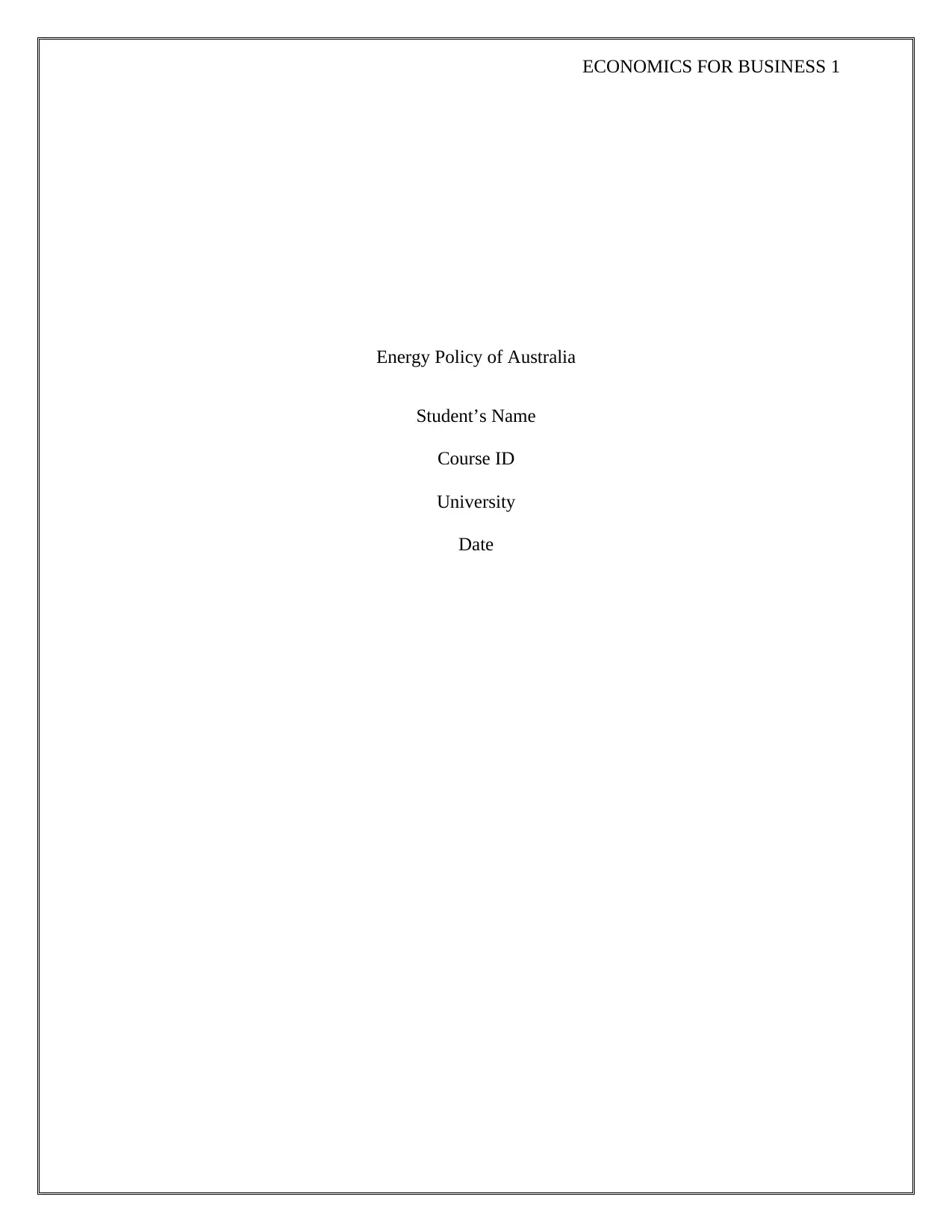
ECONOMICS FOR BUSINESS 1
Energy Policy of Australia
Student’s Name
Course ID
University
Date
Energy Policy of Australia
Student’s Name
Course ID
University
Date
Paraphrase This Document
Need a fresh take? Get an instant paraphrase of this document with our AI Paraphraser
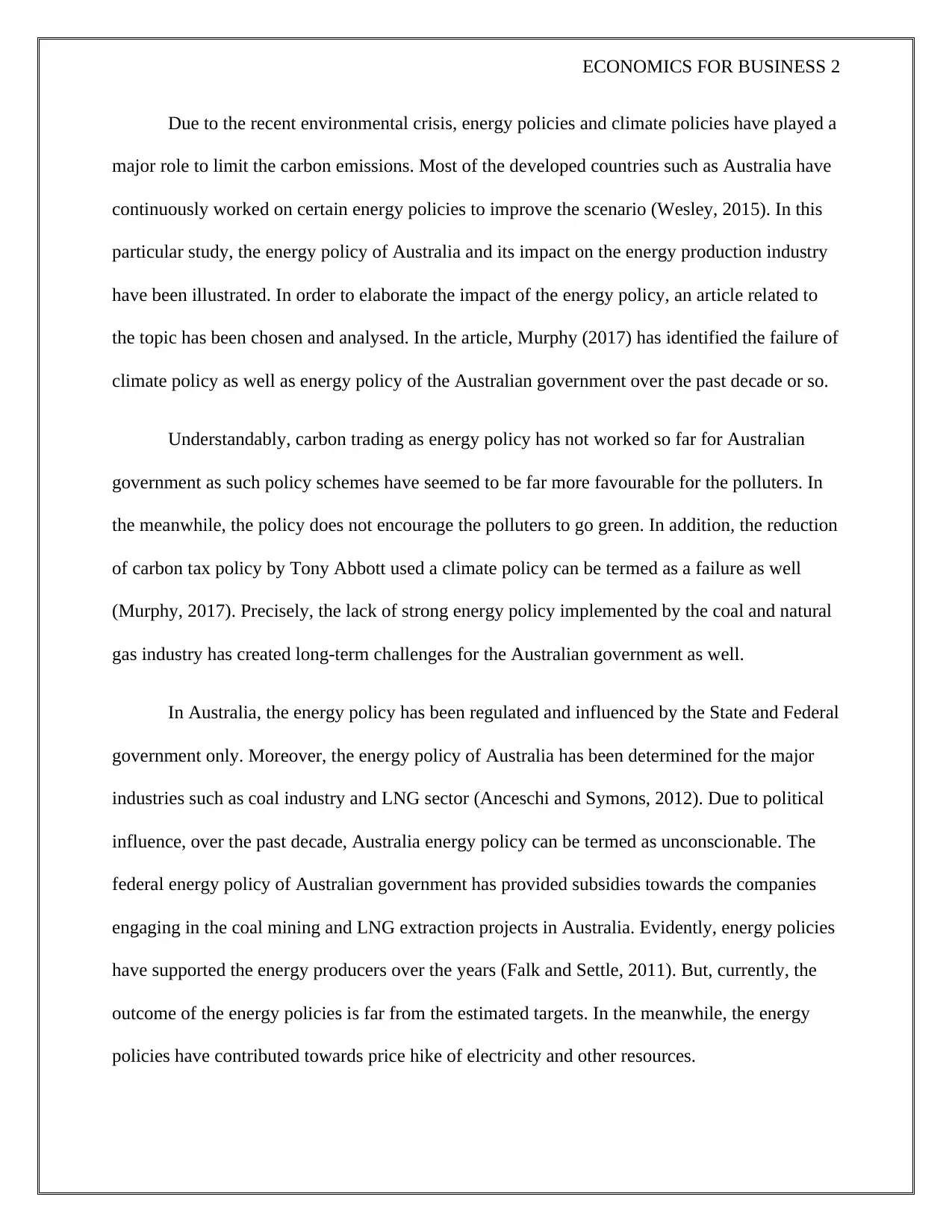
ECONOMICS FOR BUSINESS 2
Due to the recent environmental crisis, energy policies and climate policies have played a
major role to limit the carbon emissions. Most of the developed countries such as Australia have
continuously worked on certain energy policies to improve the scenario (Wesley, 2015). In this
particular study, the energy policy of Australia and its impact on the energy production industry
have been illustrated. In order to elaborate the impact of the energy policy, an article related to
the topic has been chosen and analysed. In the article, Murphy (2017) has identified the failure of
climate policy as well as energy policy of the Australian government over the past decade or so.
Understandably, carbon trading as energy policy has not worked so far for Australian
government as such policy schemes have seemed to be far more favourable for the polluters. In
the meanwhile, the policy does not encourage the polluters to go green. In addition, the reduction
of carbon tax policy by Tony Abbott used a climate policy can be termed as a failure as well
(Murphy, 2017). Precisely, the lack of strong energy policy implemented by the coal and natural
gas industry has created long-term challenges for the Australian government as well.
In Australia, the energy policy has been regulated and influenced by the State and Federal
government only. Moreover, the energy policy of Australia has been determined for the major
industries such as coal industry and LNG sector (Anceschi and Symons, 2012). Due to political
influence, over the past decade, Australia energy policy can be termed as unconscionable. The
federal energy policy of Australian government has provided subsidies towards the companies
engaging in the coal mining and LNG extraction projects in Australia. Evidently, energy policies
have supported the energy producers over the years (Falk and Settle, 2011). But, currently, the
outcome of the energy policies is far from the estimated targets. In the meanwhile, the energy
policies have contributed towards price hike of electricity and other resources.
Due to the recent environmental crisis, energy policies and climate policies have played a
major role to limit the carbon emissions. Most of the developed countries such as Australia have
continuously worked on certain energy policies to improve the scenario (Wesley, 2015). In this
particular study, the energy policy of Australia and its impact on the energy production industry
have been illustrated. In order to elaborate the impact of the energy policy, an article related to
the topic has been chosen and analysed. In the article, Murphy (2017) has identified the failure of
climate policy as well as energy policy of the Australian government over the past decade or so.
Understandably, carbon trading as energy policy has not worked so far for Australian
government as such policy schemes have seemed to be far more favourable for the polluters. In
the meanwhile, the policy does not encourage the polluters to go green. In addition, the reduction
of carbon tax policy by Tony Abbott used a climate policy can be termed as a failure as well
(Murphy, 2017). Precisely, the lack of strong energy policy implemented by the coal and natural
gas industry has created long-term challenges for the Australian government as well.
In Australia, the energy policy has been regulated and influenced by the State and Federal
government only. Moreover, the energy policy of Australia has been determined for the major
industries such as coal industry and LNG sector (Anceschi and Symons, 2012). Due to political
influence, over the past decade, Australia energy policy can be termed as unconscionable. The
federal energy policy of Australian government has provided subsidies towards the companies
engaging in the coal mining and LNG extraction projects in Australia. Evidently, energy policies
have supported the energy producers over the years (Falk and Settle, 2011). But, currently, the
outcome of the energy policies is far from the estimated targets. In the meanwhile, the energy
policies have contributed towards price hike of electricity and other resources.
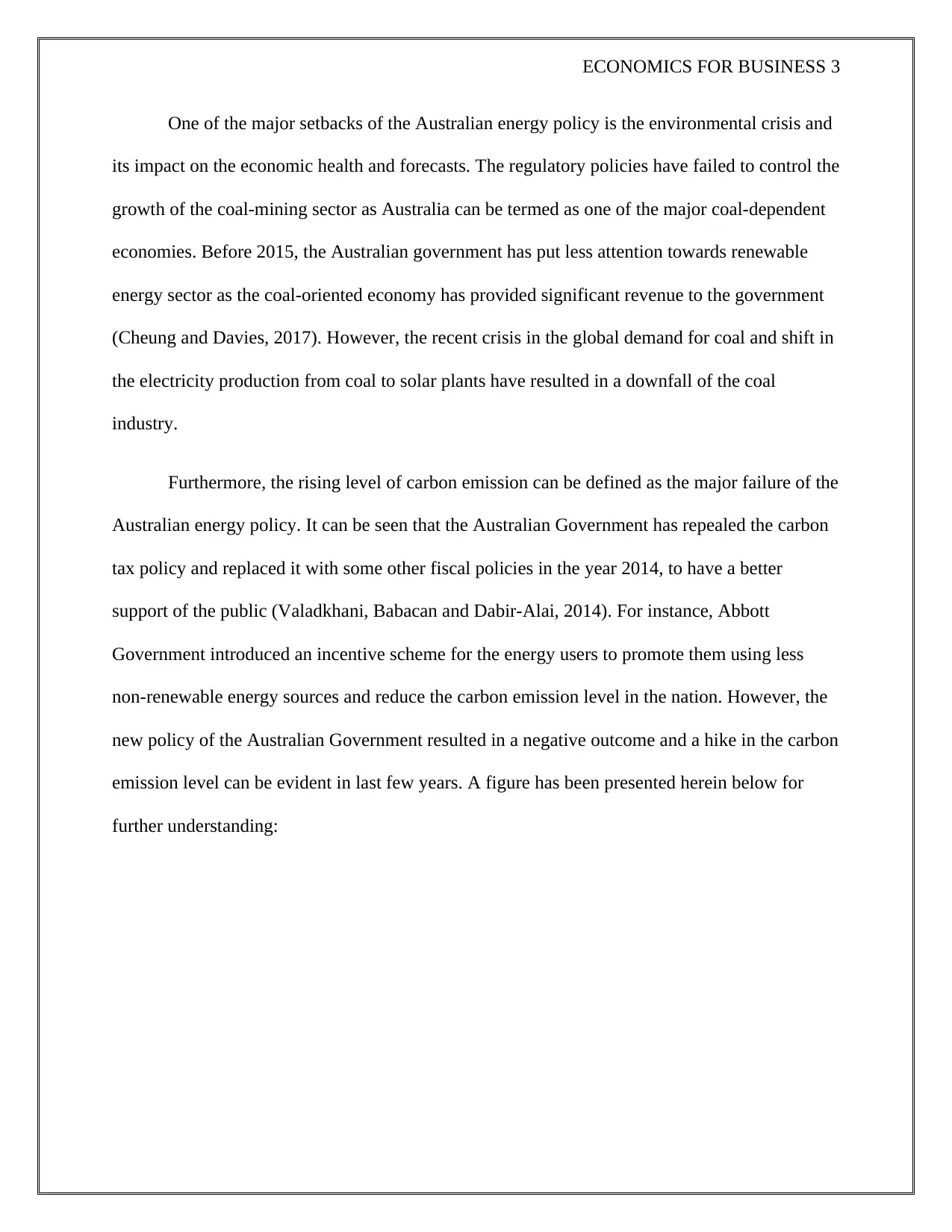
ECONOMICS FOR BUSINESS 3
One of the major setbacks of the Australian energy policy is the environmental crisis and
its impact on the economic health and forecasts. The regulatory policies have failed to control the
growth of the coal-mining sector as Australia can be termed as one of the major coal-dependent
economies. Before 2015, the Australian government has put less attention towards renewable
energy sector as the coal-oriented economy has provided significant revenue to the government
(Cheung and Davies, 2017). However, the recent crisis in the global demand for coal and shift in
the electricity production from coal to solar plants have resulted in a downfall of the coal
industry.
Furthermore, the rising level of carbon emission can be defined as the major failure of the
Australian energy policy. It can be seen that the Australian Government has repealed the carbon
tax policy and replaced it with some other fiscal policies in the year 2014, to have a better
support of the public (Valadkhani, Babacan and Dabir-Alai, 2014). For instance, Abbott
Government introduced an incentive scheme for the energy users to promote them using less
non-renewable energy sources and reduce the carbon emission level in the nation. However, the
new policy of the Australian Government resulted in a negative outcome and a hike in the carbon
emission level can be evident in last few years. A figure has been presented herein below for
further understanding:
One of the major setbacks of the Australian energy policy is the environmental crisis and
its impact on the economic health and forecasts. The regulatory policies have failed to control the
growth of the coal-mining sector as Australia can be termed as one of the major coal-dependent
economies. Before 2015, the Australian government has put less attention towards renewable
energy sector as the coal-oriented economy has provided significant revenue to the government
(Cheung and Davies, 2017). However, the recent crisis in the global demand for coal and shift in
the electricity production from coal to solar plants have resulted in a downfall of the coal
industry.
Furthermore, the rising level of carbon emission can be defined as the major failure of the
Australian energy policy. It can be seen that the Australian Government has repealed the carbon
tax policy and replaced it with some other fiscal policies in the year 2014, to have a better
support of the public (Valadkhani, Babacan and Dabir-Alai, 2014). For instance, Abbott
Government introduced an incentive scheme for the energy users to promote them using less
non-renewable energy sources and reduce the carbon emission level in the nation. However, the
new policy of the Australian Government resulted in a negative outcome and a hike in the carbon
emission level can be evident in last few years. A figure has been presented herein below for
further understanding:
⊘ This is a preview!⊘
Do you want full access?
Subscribe today to unlock all pages.

Trusted by 1+ million students worldwide
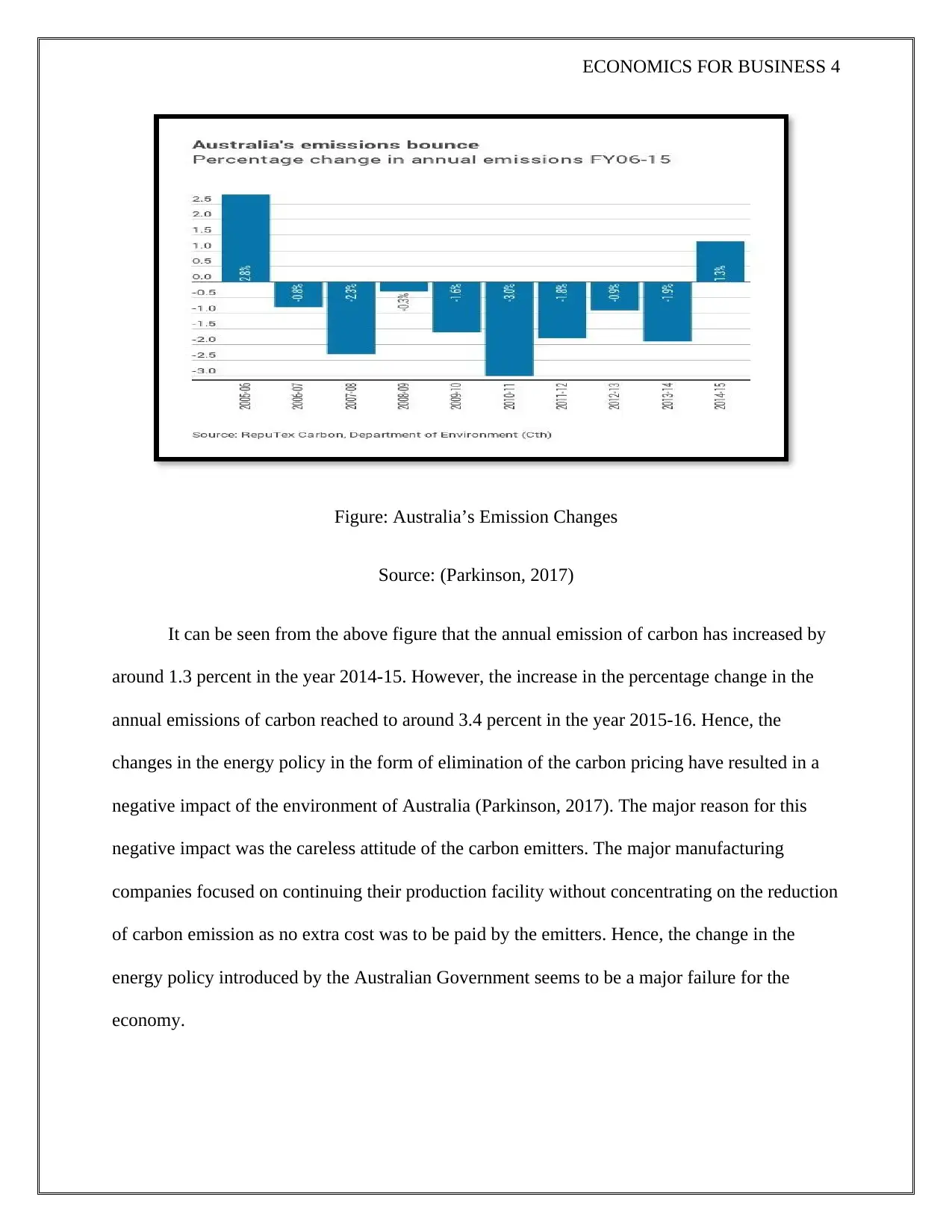
ECONOMICS FOR BUSINESS 4
Figure: Australia’s Emission Changes
Source: (Parkinson, 2017)
It can be seen from the above figure that the annual emission of carbon has increased by
around 1.3 percent in the year 2014-15. However, the increase in the percentage change in the
annual emissions of carbon reached to around 3.4 percent in the year 2015-16. Hence, the
changes in the energy policy in the form of elimination of the carbon pricing have resulted in a
negative impact of the environment of Australia (Parkinson, 2017). The major reason for this
negative impact was the careless attitude of the carbon emitters. The major manufacturing
companies focused on continuing their production facility without concentrating on the reduction
of carbon emission as no extra cost was to be paid by the emitters. Hence, the change in the
energy policy introduced by the Australian Government seems to be a major failure for the
economy.
Figure: Australia’s Emission Changes
Source: (Parkinson, 2017)
It can be seen from the above figure that the annual emission of carbon has increased by
around 1.3 percent in the year 2014-15. However, the increase in the percentage change in the
annual emissions of carbon reached to around 3.4 percent in the year 2015-16. Hence, the
changes in the energy policy in the form of elimination of the carbon pricing have resulted in a
negative impact of the environment of Australia (Parkinson, 2017). The major reason for this
negative impact was the careless attitude of the carbon emitters. The major manufacturing
companies focused on continuing their production facility without concentrating on the reduction
of carbon emission as no extra cost was to be paid by the emitters. Hence, the change in the
energy policy introduced by the Australian Government seems to be a major failure for the
economy.
Paraphrase This Document
Need a fresh take? Get an instant paraphrase of this document with our AI Paraphraser
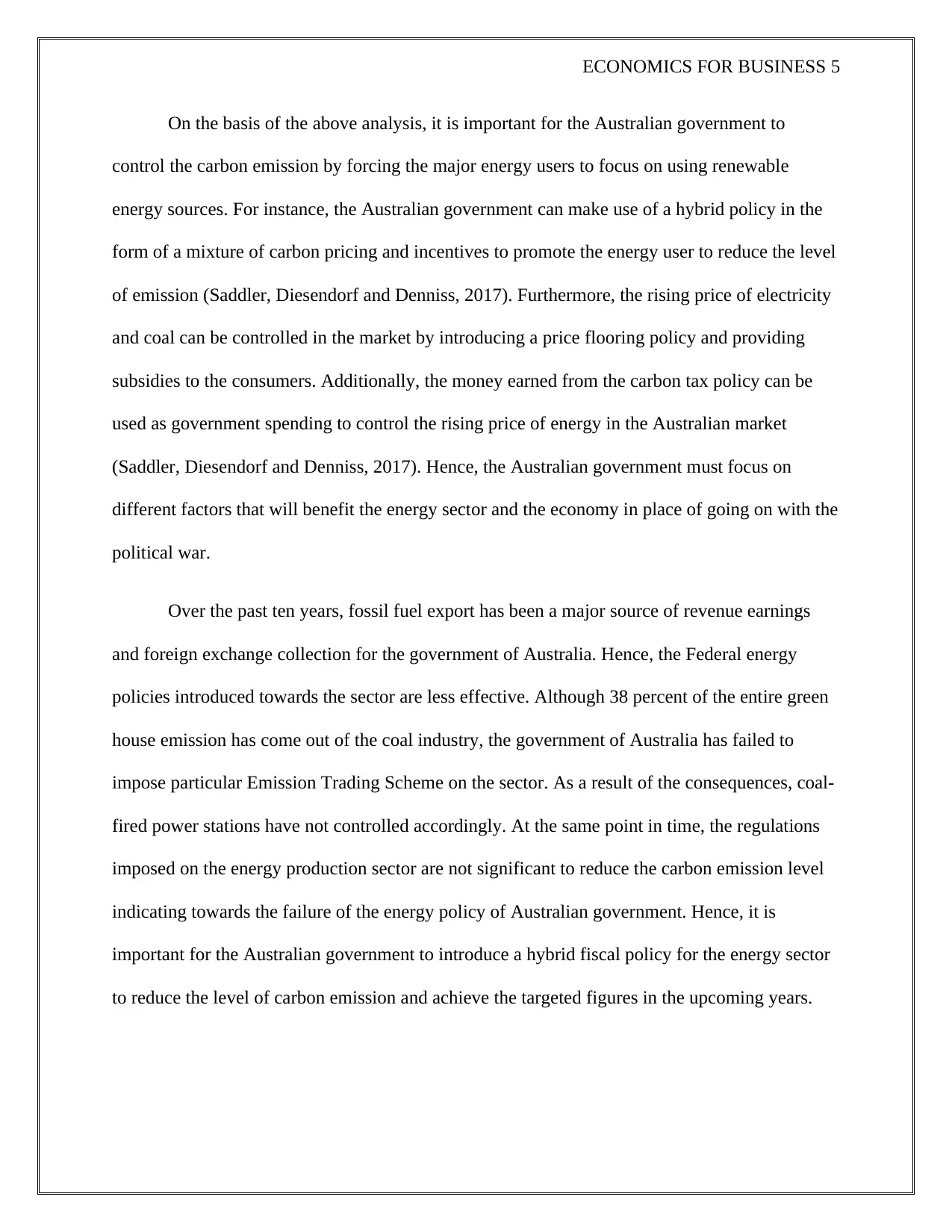
ECONOMICS FOR BUSINESS 5
On the basis of the above analysis, it is important for the Australian government to
control the carbon emission by forcing the major energy users to focus on using renewable
energy sources. For instance, the Australian government can make use of a hybrid policy in the
form of a mixture of carbon pricing and incentives to promote the energy user to reduce the level
of emission (Saddler, Diesendorf and Denniss, 2017). Furthermore, the rising price of electricity
and coal can be controlled in the market by introducing a price flooring policy and providing
subsidies to the consumers. Additionally, the money earned from the carbon tax policy can be
used as government spending to control the rising price of energy in the Australian market
(Saddler, Diesendorf and Denniss, 2017). Hence, the Australian government must focus on
different factors that will benefit the energy sector and the economy in place of going on with the
political war.
Over the past ten years, fossil fuel export has been a major source of revenue earnings
and foreign exchange collection for the government of Australia. Hence, the Federal energy
policies introduced towards the sector are less effective. Although 38 percent of the entire green
house emission has come out of the coal industry, the government of Australia has failed to
impose particular Emission Trading Scheme on the sector. As a result of the consequences, coal-
fired power stations have not controlled accordingly. At the same point in time, the regulations
imposed on the energy production sector are not significant to reduce the carbon emission level
indicating towards the failure of the energy policy of Australian government. Hence, it is
important for the Australian government to introduce a hybrid fiscal policy for the energy sector
to reduce the level of carbon emission and achieve the targeted figures in the upcoming years.
On the basis of the above analysis, it is important for the Australian government to
control the carbon emission by forcing the major energy users to focus on using renewable
energy sources. For instance, the Australian government can make use of a hybrid policy in the
form of a mixture of carbon pricing and incentives to promote the energy user to reduce the level
of emission (Saddler, Diesendorf and Denniss, 2017). Furthermore, the rising price of electricity
and coal can be controlled in the market by introducing a price flooring policy and providing
subsidies to the consumers. Additionally, the money earned from the carbon tax policy can be
used as government spending to control the rising price of energy in the Australian market
(Saddler, Diesendorf and Denniss, 2017). Hence, the Australian government must focus on
different factors that will benefit the energy sector and the economy in place of going on with the
political war.
Over the past ten years, fossil fuel export has been a major source of revenue earnings
and foreign exchange collection for the government of Australia. Hence, the Federal energy
policies introduced towards the sector are less effective. Although 38 percent of the entire green
house emission has come out of the coal industry, the government of Australia has failed to
impose particular Emission Trading Scheme on the sector. As a result of the consequences, coal-
fired power stations have not controlled accordingly. At the same point in time, the regulations
imposed on the energy production sector are not significant to reduce the carbon emission level
indicating towards the failure of the energy policy of Australian government. Hence, it is
important for the Australian government to introduce a hybrid fiscal policy for the energy sector
to reduce the level of carbon emission and achieve the targeted figures in the upcoming years.
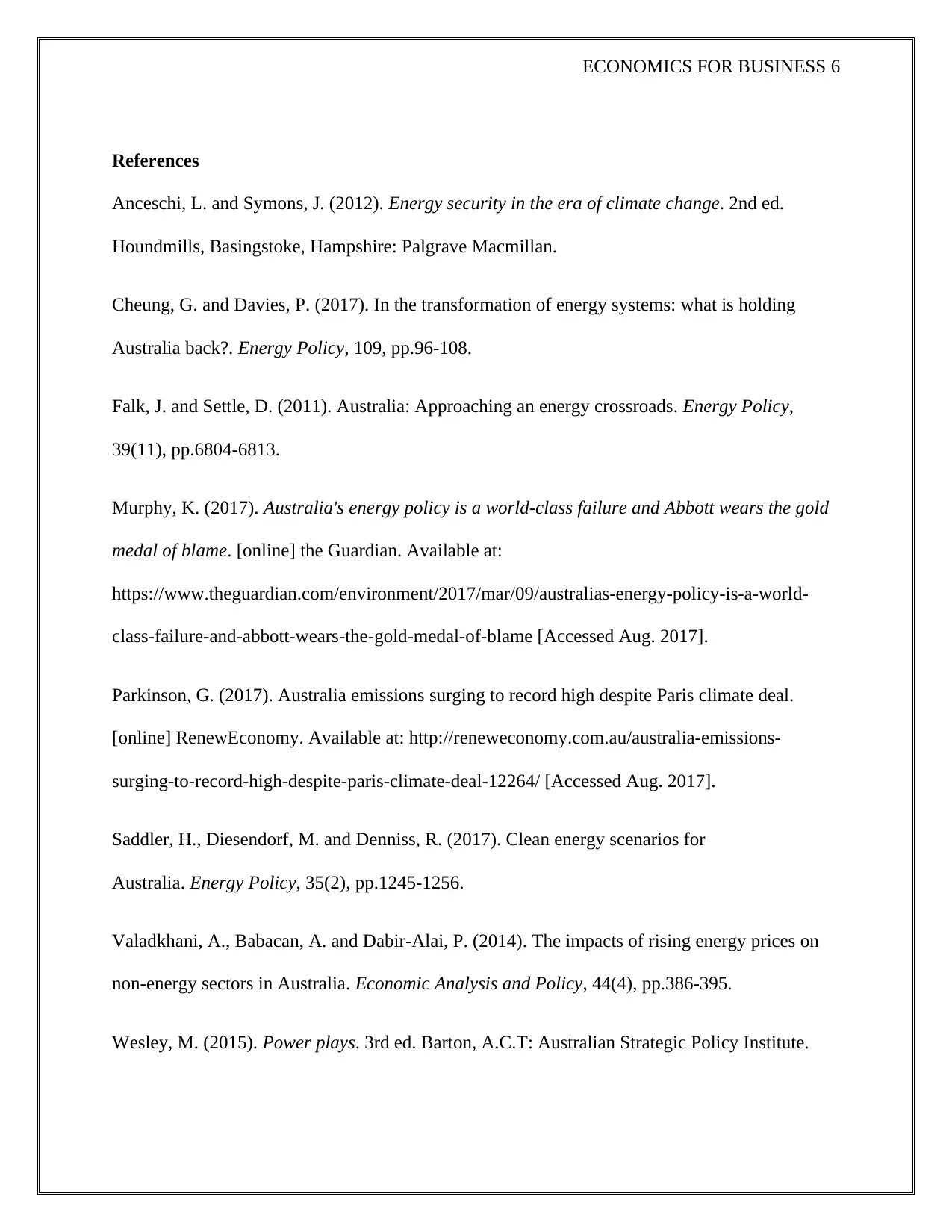
ECONOMICS FOR BUSINESS 6
References
Anceschi, L. and Symons, J. (2012). Energy security in the era of climate change. 2nd ed.
Houndmills, Basingstoke, Hampshire: Palgrave Macmillan.
Cheung, G. and Davies, P. (2017). In the transformation of energy systems: what is holding
Australia back?. Energy Policy, 109, pp.96-108.
Falk, J. and Settle, D. (2011). Australia: Approaching an energy crossroads. Energy Policy,
39(11), pp.6804-6813.
Murphy, K. (2017). Australia's energy policy is a world-class failure and Abbott wears the gold
medal of blame. [online] the Guardian. Available at:
https://www.theguardian.com/environment/2017/mar/09/australias-energy-policy-is-a-world-
class-failure-and-abbott-wears-the-gold-medal-of-blame [Accessed Aug. 2017].
Parkinson, G. (2017). Australia emissions surging to record high despite Paris climate deal.
[online] RenewEconomy. Available at: http://reneweconomy.com.au/australia-emissions-
surging-to-record-high-despite-paris-climate-deal-12264/ [Accessed Aug. 2017].
Saddler, H., Diesendorf, M. and Denniss, R. (2017). Clean energy scenarios for
Australia. Energy Policy, 35(2), pp.1245-1256.
Valadkhani, A., Babacan, A. and Dabir-Alai, P. (2014). The impacts of rising energy prices on
non-energy sectors in Australia. Economic Analysis and Policy, 44(4), pp.386-395.
Wesley, M. (2015). Power plays. 3rd ed. Barton, A.C.T: Australian Strategic Policy Institute.
References
Anceschi, L. and Symons, J. (2012). Energy security in the era of climate change. 2nd ed.
Houndmills, Basingstoke, Hampshire: Palgrave Macmillan.
Cheung, G. and Davies, P. (2017). In the transformation of energy systems: what is holding
Australia back?. Energy Policy, 109, pp.96-108.
Falk, J. and Settle, D. (2011). Australia: Approaching an energy crossroads. Energy Policy,
39(11), pp.6804-6813.
Murphy, K. (2017). Australia's energy policy is a world-class failure and Abbott wears the gold
medal of blame. [online] the Guardian. Available at:
https://www.theguardian.com/environment/2017/mar/09/australias-energy-policy-is-a-world-
class-failure-and-abbott-wears-the-gold-medal-of-blame [Accessed Aug. 2017].
Parkinson, G. (2017). Australia emissions surging to record high despite Paris climate deal.
[online] RenewEconomy. Available at: http://reneweconomy.com.au/australia-emissions-
surging-to-record-high-despite-paris-climate-deal-12264/ [Accessed Aug. 2017].
Saddler, H., Diesendorf, M. and Denniss, R. (2017). Clean energy scenarios for
Australia. Energy Policy, 35(2), pp.1245-1256.
Valadkhani, A., Babacan, A. and Dabir-Alai, P. (2014). The impacts of rising energy prices on
non-energy sectors in Australia. Economic Analysis and Policy, 44(4), pp.386-395.
Wesley, M. (2015). Power plays. 3rd ed. Barton, A.C.T: Australian Strategic Policy Institute.
⊘ This is a preview!⊘
Do you want full access?
Subscribe today to unlock all pages.

Trusted by 1+ million students worldwide
1 out of 6
Related Documents
Your All-in-One AI-Powered Toolkit for Academic Success.
+13062052269
info@desklib.com
Available 24*7 on WhatsApp / Email
![[object Object]](/_next/static/media/star-bottom.7253800d.svg)
Unlock your academic potential
Copyright © 2020–2026 A2Z Services. All Rights Reserved. Developed and managed by ZUCOL.




